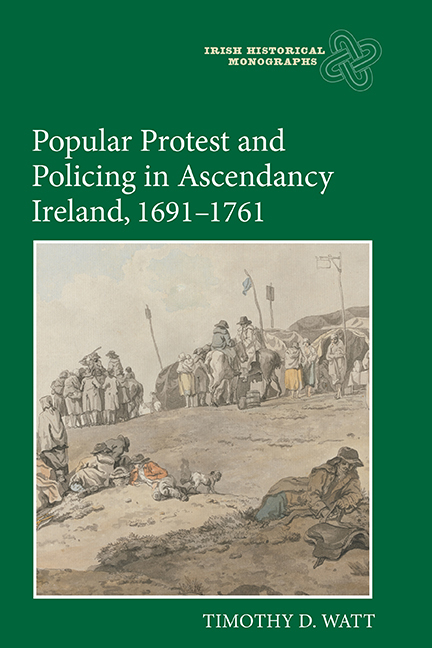Book contents
- Frontmatter
- Dedication
- Contents
- List of illustrations
- Acknowledgements
- Principal abbreviations
- Notes on conventions
- Glossary
- Introduction
- Part One Policing and large-scale disorder
- Part Two Popular Protest and Collective Action
- 4 ‘Mobs’, Authorities and Popular Politics
- 5 A ‘Rebellious Traditional Culture’ in Ireland
- 6 ‘Riot and Rescue’ and Anti-Taxation Protest
- 7 Journeymen, Masters and ‘Collective Bargaining by Riot’ in Dublin
- 8 Factional Gangs, Authorities and Corruption of the Law in Dublin
- 9 Conclusion
- Appendix: Irish Combination Acts, 1705–80
- Bibliography
- Index
- Irish Historical Monographs previous volumes
9 - Conclusion
from Part Two - Popular Protest and Collective Action
Published online by Cambridge University Press: 12 October 2019
- Frontmatter
- Dedication
- Contents
- List of illustrations
- Acknowledgements
- Principal abbreviations
- Notes on conventions
- Glossary
- Introduction
- Part One Policing and large-scale disorder
- Part Two Popular Protest and Collective Action
- 4 ‘Mobs’, Authorities and Popular Politics
- 5 A ‘Rebellious Traditional Culture’ in Ireland
- 6 ‘Riot and Rescue’ and Anti-Taxation Protest
- 7 Journeymen, Masters and ‘Collective Bargaining by Riot’ in Dublin
- 8 Factional Gangs, Authorities and Corruption of the Law in Dublin
- 9 Conclusion
- Appendix: Irish Combination Acts, 1705–80
- Bibliography
- Index
- Irish Historical Monographs previous volumes
Summary
Historians of eighteenth-century Ireland have interpreted large-scale violence involving government forces and the general populace in two, contradictory, ways. Broadly speaking, on one side of the debate are historians like Thomas Bartlett, S. J. Connolly, Neal Garnham, James Kelly and M. J. Powell, who have emphasised harmony rather than conflict in social relations, at least until the 1790s. According to S. J. Connolly, Ireland in the early eighteenth century was in many respects a typical pre-industrial society in ancien régime Europe,
ruled over by a mainly landed élite, in which vertical ties of patronage and clientship were more important than horizontal bonds of shared economic or social position, and in which even popular protest was conducted within the assumptions that underlay the existing social order.
Also it was a ‘confessional state’, in which religion was a central aspect of personal and political motivation and in which differences in religious devotion were a fundamental cause of conflict. However, the outlook of the ruling elite with regard to an unreconciled Catholic population and its allies in Europe was ‘a wary confidence in the face of a real, but containable, threat’. This confidence arose in part because the people who joined in localised outbreaks of agrarian violence and urban protest often were controlled and disciplined. According to Neal Garnham, ‘popular protest … tended to be restrained, conservative, even deferential’. Also, the civil authorities deterred people from breaking laws by occasionally handing down harsh punishments in courts such as to hang convicted offenders and display parts of their dismembered bodies in public places. However, they did not practise judicial torture as was commonplace in some other European countries, and there were no ‘forests of corpses’.
Critics of this analysis, who include Vincent Morley, Breandán Ó Buachalla, Éamonn Ó Ciardha and Kevin Whelan, have interpreted violence in late seventeenth- and eighteenth-century Ireland in entirely different ways. Kevin Whelan has argued that Ireland is better understood as a colony of England, as opposed to a representative ancien régime society, in which the descendants of the old proprietors of land, who had ‘mutated into an underground gentry’, waited for the opportunity to reclaim their rightful place at the head of Irish society.
- Type
- Chapter
- Information
- Popular Protest and Policing in Ascendancy Ireland, 1691-1761 , pp. 204 - 214Publisher: Boydell & BrewerPrint publication year: 2018



